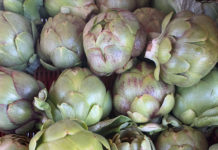While washing dishes the other night I was contemplating what this month’s topic should be for the Market Report. As I squeezed the environmentally friendly liquid detergent onto the sponge, I realized my dishwashing ritual has changed substantially this past year. I never use the dishwasher, since it’s just the two of us. But in hand-washing I no longer run the water until it gets hot, so my plates and cups are getting washed with soap and warmish water. I catch and dump into a bucket all the water, be it clean, dirty, soapy or laden with food bits or a scattering of coffee grounds. When we take showers we run the tub first, filling a bucket until the water is hot. All of it is used to water our potted plants in the garden. My showers are half the length they used to be and I skip them a couple of days a week (I promise not on market days!). I used to wash two loads of laundry a week, but now do one giant one, since I wear my pants and shirts a couple of days more. Drought behavior.
We’ve got some serious stuff going on with water right now, so it seemed something important to write about. As a farmers market manager I don’t have any direct issues with water usage. We use none at the market itself, except for the half gallon I bring for customer and vendors to drink. But some of our farmers and ranchers … that’s a different story.
Our hearts go out to Front Porch Farm, located on Rio Linda Drive above the Russian River. They’ve had such steep water curtailment they’re discontinuing selling at our market at the end of this month. The loss of this farm, whose production and variety had been substantially more than many others who do our market, is a shock and a big reality hit as to the extremity of the situation.
Longer Table Farm, on the eastern edge of Santa Rosa, has had their water allotment from the city decreased to 25% of their normal amount. Will has managed to keep alive via shifting much of his irrigation over to his well which has involved well over $10,000 in equipment upgrades. They’ve opted to not grow some of the water intensive crops like corn and switched to more efficient crops, like hard squash. They’re also using more subsurface irrigation to prevent evaporation loss and not growing the summer cover crops they usually would.
Achadinha Cheese Company in Petaluma has watched their natural ponds go dry and now trucks in 3,500 gallons of water per week to keep them filled for their cattle. Jim fears if the drought continues into late fall they may have to sell off most of their cattle, keeping only the amount they needs to continue cheese production.
Fortunately many of our other farms are on good wells and have enough, but some are implementing dry farming methods, or getting creative in other ways to make sure they can weather the storm, or lack thereof.
This may translate to higher prices at the market, or not, but if it does, I know all of you reading this will understand. I’m sure you’re aware of the water situation in Healdsburg, and in the county, and are practicing your own version of drought behavior during this difficult time.
Though unrelated to this topic, I wanted to end my Market Report with something upbeat, so thought I’d include a delicious recipe to try. Thanks to Gergana (from Patisserie Angelica) for introducing me to this traditional Eastern European dish, which we make frequently at our house. This is my version. Enjoy…
Lamb Kefta
Ingredients:
1 package ground lamb (Shannon Ranch)
1 egg
1 cup bread crumbs
½ onion finely chopped
3 cloves garlic, minced
1 tsp cinnamon
1/2 tsp allspice
2 tsp cumin (or 1 tsp cumin and 1 tsp fenugreek)
salt and pepper
½ cup currants (I use chopped up raisins from Neufeld, or chopped up dates from Jewel Date)
6 flatbread (Greek Table)
Tzatziki sauce:
1 cup plain yogurt
2 cloves garlic, finely chopped
¼ cucumber, chopped in small chunks
2 tsp lemon juice
½ tsp dill (or mint)
salt and pepper to taste
Directions:
Combine meat with egg, breadcrumbs, garlic, onion, spices and currants, and make meat balls. Put on skewers and grill on the barbecue, or you can skip skewering them, and fry them in a pan.
While kefta are cooking, heat oven to 300 degrees and warm the flatbreads. Mix yogurt, garlic, cucumber, lemon juice and spices together to make sauce.
Load each flatbread with two kefta and sauce. Enjoy!
Janet Ciel is the manager of the Healdsburg Farmers’ Market. She can be reached at ma*****@he*********************.org.








